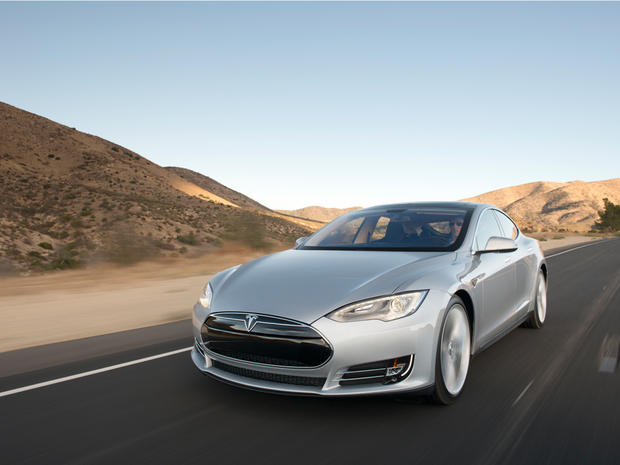
Tesla's Model SD has Autopilot, which can detect collision risks, and a camera to monitor road activity. Elon Musk says that a fully-autonomous vehicle will be available by 2018.
This week in Australia, self-driving cars will be hitting the public roads. The cars, powered by technology from German manufacturer Bosch, have been developed in partnership with the Australian government, which invested $1.2 million in the project.
Sporting Tesla shells as the exterior, these autonomous cars are built with a combination of sensors—including six radars, six LiDAR (built to spin 360 degrees), high resolution GPS, and a stereo video camera.
And, according to ABC News, they are reportedly "designed to navigate roads with or without driver input."
The announcement follows a steady stream of new releases in the autonomous driving world. In August, Singapore launched driverless taxis. In September, Uber unveiled a self-driving fleet in Pittsburgh. Tesla recently updated its Autopilot software, touting that the new technology, which relies heavily on radar, can detect dense objects ahead. Ford announced that it will mass-produce a completely autonomous car by 2021.
John Dolan, principal systems scientist in the Robotics Institute at Carnegie Mellon University, said that the sensors are "fairly standard for research-level autonomous cars," although he thinks the stereo cameras are less common. Jeffrey Miller, associate professor of engineering practice at the University of Southern California, thinks that six LiDAR are a lot. He guesses that Bosch is "relying more on LIDAR for determining what is around the vehicle rather than the cameras."
"Bosch, like Continental and Delphi, is vying to build their own platforms for offering vehicle autonomy," said Michael Ramsey, autonomous vehicle analyst at Gartner. "They certainly have capability as one of the largest auto parts makers in the world." But the description of the technology, Ramsey said, "seems in line with or behind operations of others, like Google or even nuTonomy, which is running public tests of autonomous vehicles on the road in Singapore right now."
SEE: Tesla driver dies in first fatality with Autopilot: What it means for the future of driverless cars (TechRepublic)
But each of the experts—Smith, Dolan, Ramsey, and Miller—agree that without specifics on the number of test miles driven, it is difficult to gauge how advanced these vehicles are, and is unclear whether they are better than anything currently on the road. "Its features don't sound substantially different than the capabilities of some production vehicles, prototypes, and research systems on the road today," said Bryant Walker Smith, one of the leading experts in the legal aspects of autonomous driving.
But, most problematically, there seems to be some mischaracterization of the terminology.
(Want a refresher? Here's what the different levels of autonomy mean.)
"If a human needs to do any kind of supervision or intervention, then it is not Level 4 as SAE and NHTSA and others define that term," said Smith.
Why is this important? Because we need to know the cars' limitations.
"The caveats tend to stand out more than the claims," said Smith. "In particular, why does it still need a human behind the wheel? Where? Under what conditions?" A few years ago, Smith said, "companies went through a battle of the press releases, which produced unrealistically high expectations among the public."
So it's critical, he said, to use the correct terminology when we discuss these vehicles—and separate the hype from the facts.
Also see...
- When your driverless car crashes, who will be responsible? The answer remains unclear (TechRepublic)
- Tesla's New Autopilot Update (CBS News)
- Tesla's Musk says Autopilot update would have prevented fatal crash
- (ZDNet)
- When will we get driverless cars? Experts say public opinion is the critical factor (TechRepublic)
- Tesla launching 'major improvements' to Autopilot in coming weeks (ZDNet)
- Learn Tesla Model 3's key moves in autonomous driving, batteries, and charging (TechRepublic)
- Tesla's fatal Autopilot accident: Why the New York Times got it wrong(TechRepublic)
- Why the US government should take Tesla up on its offer to share Autopilot data (TechRepublic)
- Tesla speaks: How we will overcome the obstacles to driverless vehicles (TechRepublic)
- Autonomous driving levels 0 to 5: Understanding the differences(TechRepublic)
Disclosure
Hope Reese has nothing to disclose. She doesn't hold investments in the technology companies she covers.
Full Bio
Hope Reese is a Staff Writer for TechRepublic. She covers the intersection of technology and society, examining the people and ideas that transform how we live today.









